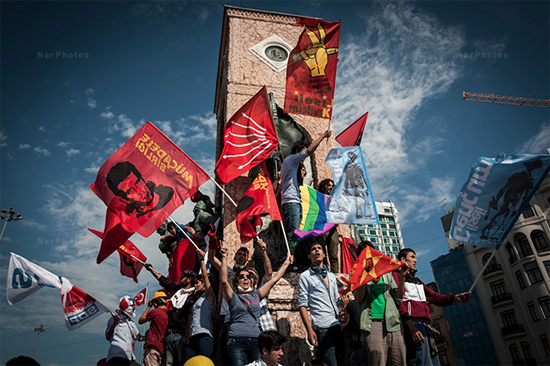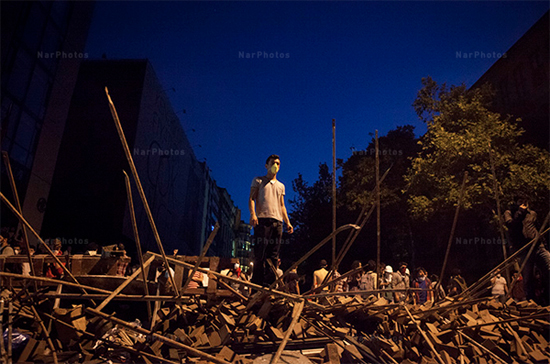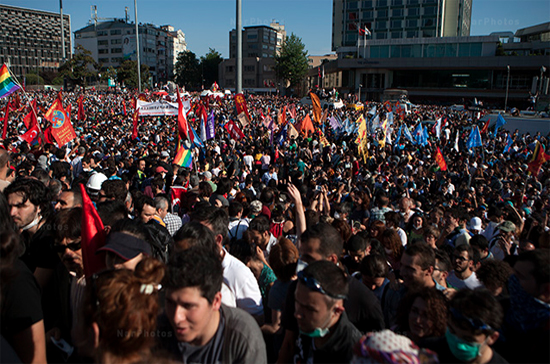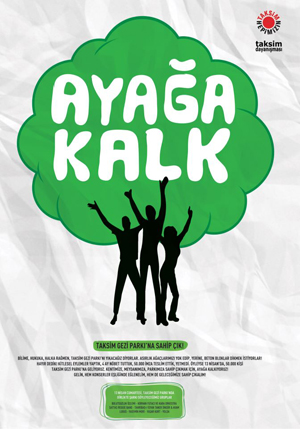Beneath water cannons, barricades, and the fiercest citizen uprising in Turkey’s recent history is the story of one little park and the people who stood up for it.
On May 28, a peaceful, apolitical crowd of demonstrators set up camp in Taksim Gezi Park to prevent its redevelopment into a shopping mall. They said the park, while one of the smallest in Istanbul, is the only remaining space in the densely populated neighborhood that provides a green haven for the public. On May 31st, police moved in at dawn, and the sleeping protesters awoke to the burn of tear gas. In the hours and days that followed the raid, the crowd of demonstrators grew from hundreds into thousands.
The use of excessive force by police sparked what we now know as the largest anti-government demonstrations in Turkey since its current leadership came into power. People found themselves speaking out over more than the government’s reshaping of urban areas. “It’s not about the park anymore. It’s about the authoritarian drift of [Prime Minister Recep Tayyip Erdogan]” reported CNN’s Ivan Watson.
Turkish newspaper columnist Asli Aydintasbas told CNN, “It’s not just a bunch of tree huggers, not just about the park… but because this was about a park being demolished, a mall being built, and the prime minister’s one-man style of governing, a lot of conservatives have expressed unhappiness. There were women with headscarves [in the park] because people do not want trees cut down.”
While no one can say what direction this new movement will take, the eruption of protests are a reminder that a single sliver of space can mean so much more than a few extra trees and shrubs in the urban landscape. Thousands crossed the political divide in an increasingly polarized country to defend their dwindling green space and, ultimately, to voice their concern over the direction of their country. “Don’t touch our neighborhood, our squares, our trees, our water, our soil, our homes, our villages, our cities and our parks,” read one banner hanging in the park, reported the New York Times. Chants of “Everywhere is resistance, everywhere is Taksim” were heard in duplicated demonstrations across the country.
Miki Tamura, a Pace University alum and Fulbright Scholar, is stationed in Turkey. She reports, “In Gaziantep, there have been protests in support of Gezi Park, and all the political issues that now surround it of course, for the past few days. I live close to the university and many young students have been taking part with flashing lights, horns, clanging pots, and chanting with signs. A larger protest occurs at a park closer to the city center. It’s always full, from children to the elderly.”
Public parks have environmental benefits, certainly, from wildlife habitats to natural water filters. But they also represent physical freedom and aesthetic expression in an increasingly commercialized world. They serve as secular, apolitical peace-zones where people can come together, no matter their personal backgrounds — sometimes to protect that very same green space.
Occupy Gezi, as some are calling it, is by no means the first movement started in a public park, and it will not be the last. But its example, and its message, is something to keep in mind at your next community meeting.
* * *
 Our deep gratitude to the courageous and talented photographers at NarPhoto in Istanbul, Turkey, who graciously allowed us to use their images “in solidarity.” NarPhoto is “an independent collective established in 2003 by photographers for whom documentary photography is a visual tool of ‘understanding and expressing’ the world.” Their photographs of the protests at Taksim Gezi Park are beautiful and moving. You can see more at their website: http://www.narphotos.net/AnaSayfa/Default.aspx.
Our deep gratitude to the courageous and talented photographers at NarPhoto in Istanbul, Turkey, who graciously allowed us to use their images “in solidarity.” NarPhoto is “an independent collective established in 2003 by photographers for whom documentary photography is a visual tool of ‘understanding and expressing’ the world.” Their photographs of the protests at Taksim Gezi Park are beautiful and moving. You can see more at their website: http://www.narphotos.net/AnaSayfa/Default.aspx.














There is no doubt terrorism is alive and well- and in many instances- it is the governments that are the terrorists.
truth
Just returned from 3 nights in Istanbul, Our hotel was very close to the Park and the Square. Our thoughts and best wishes are with you.